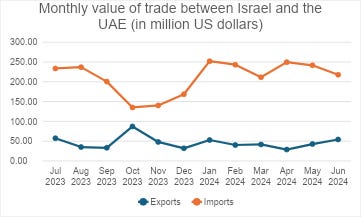Insight: The Geopolitical Consequences of the Gaza War for the Gulf States
The 15-month war impacted the potential for a Saudi-Israeli deal, pushed UAE-Israeli trade further out of the public eye, and disrupted a major global supply chain route through the Red Sea.
In January 2025, Israel and Hamas finally reached a ceasefire agreement, bringing an end to the devastating war in Gaza and securing the release of Israeli hostages and Palestinian prisoners. After 15 months of destruction, attention is now shifting to competing visions for the post-war order and the reconstruction of Gaza. However, rebuilding will take place in a drastically altered geopolitical landscape—one where the repercussions of the war extend far beyond Gaza, including to the Arab Gulf states. While these states were not directly drawn into the conflict, they remain pivotal to shaping the region’s future. What are these changes and what are the implications for the Gulf states?
Saudi-Israeli Normalization
Before the Gaza war erupted in October 2023, Saudi-Israeli normalization seemed within reach, marking what many saw as a historic breakthrough in regional diplomacy. Advocates framed it as the next major step after the Abraham Accords, which, brokered by the U.S. in 2020, had already established formal ties between Israel and the UAE, Bahrain, Morocco, and Sudan. These agreements were the most significant Israeli-Arab diplomatic developments since Israel’s peace treaties with Egypt and Jordan in the late 20th century. For Israel, normalization with Saudi Arabia promised deeper regional integration without requiring concessions on Palestinian statehood—long the central issue in Israeli-Arab relations. The Abraham Accords had already delivered economic and security benefits, from trade and tourism to technological cooperation, at little political cost for Israel. A deal with Riyadh would have further solidified these gains while strengthening the regional front against Iran.
Saudi Arabia has approached normalization with Israel cautiously, shaped by several key considerations. First, as the custodian of Islam’s two holiest sites, Riyadh occupies a unique position in the Arab and Islamic worlds. Any move toward normalization would be subject to intense scrutiny, both domestically and across the broader Muslim community, in a way that Bahrain or the UAE have not faced. Second, King Salman has remained a steadfast supporter of the Palestinian cause, consistently reaffirming Saudi Arabia’s commitment to the 2002 Arab Peace Initiative (API), which conditions normalization on the establishment of a viable Palestinian state. Third, and perhaps most crucially, for Crown Prince Mohammed bin Salman (MBS), normalization was not primarily about Israel itself but about leveraging the process to secure strategic concessions from the United States. Riyadh sought a defence pact, civil nuclear cooperation, and other security guarantees from Washington as part of any potential deal. In this context, the Palestinian issue functioned less as an ideological red line and more as a bargaining chip for advancing Saudi national interests.
The push for normalization gained momentum in part due to the Biden administration’s active involvement. President Joe Biden invested considerable political capital in advancing the process, viewing it not just as a diplomatic breakthrough but as a strategic culmination of U.S.-led efforts to redefine Israel’s regional role following the Abraham Accords. Beyond policy considerations, Biden and his core foreign policy advisors appeared to hold a deep personal belief in the significance of Saudi-Israeli normalization. This enthusiasm may have signaled to Riyadh that it could demand an even higher price from Washington in exchange for a deal.
The outbreak of war in 2023 effectively put Saudi-Israeli normalization on hold, with MBS claiming that any agreement would have to align with the Arab Peace Initiative—most crucially, the establishment of a Palestinian state. MBS explicitly stated that diplomatic relations with Israel would be contingent on achieving a two-state solution—an outcome that any Israeli government, especially one reliant on far-right constituencies, would categorically reject. Moreover, Israel’s actions in Gaza have drawn strong condemnation from Saudi elites. MBS reportedly labelled the war as a genocide, while Prince Turki Al-Faisal described Israel as a “genocidal apartheid state.” That said, Saudi Arabia in 2025 is not the Saudi Arabia of 1973—it will not weaponize oil supplies over U.S. support for Israel. However, domestic political pressures, outrage over Israeli actions, and President Biden’s unwillingness—or inability—to exert meaningful pressure on Israel make it difficult for MBS to move forward with normalization without appearing weak. While Donald Trump’s return to power may shift Saudi calculations, reversing such strong rhetoric and proceeding with normalization under current conditions would be a formidable challenge.
UAE-Israel trade
The war had a far less significant impact on Emirati-Israeli relations, leaving trade ties between Israel and the UAE largely intact. The Abraham Accords not only facilitated Israeli tourism to an Arab country but also fostered trade—particularly in diamonds—and investment opportunities. According to Emirati authorities, tourism flourished, with over one million Israelis visiting the UAE by 2023. As expected, Emirati exports to Israel declined from $237 million in August 2023 to $135 million by October 2023 but quickly returned to pre-war levels. Overall, the economic relationship between the UAE and Israel appears to have remained largely resilient in the face of the conflict.
Although overall trade levels remained relatively stable, reports suggest that the war has dampened the public enthusiasm that once characterized Emirati-Israeli economic ties. High-profile celebrations of bilateral trade on social media have waned, and business dealings have become more discreet, as Emirati businesspeople seek to avoid reputational risks associated with maintaining commercial ties with Israel. Ultimately, however, these changes appear largely cosmetic, reflecting a strategic political decision rather than a fundamental shift in relations. This stands in contrast to Turkish-Israeli trade, which collapsed by April 2024 after President Erdogan halted exports to Israel, citing blocked humanitarian aid deliveries into Gaza. A month later, he escalated the measure to a full trade embargo, marking a stark divergence from the UAE’s approach.
Red Sea & The Houthis
The Red Sea serves as a vital artery for global commerce, linking Asia, Europe, and Africa and for oil and gas shipped from the Arab Gulf states in particular. Around 15% of worldwide trade flows through its waters, making it a strategic lifeline for the global economy. The Bab al-Mandab Strait and the Suez Canal, two critical chokepoints, are essential for maritime traffic, particularly for energy exports from the Middle East. Any disruption in this corridor has widespread economic consequences. The latest instability stems from the broader fallout of the Israel-Hamas war, which has triggered regional conflicts. Among the most disruptive actors are Yemen’s Houthis, who, despite not being direct participants in the war, have launched attacks on both Israeli and commercial shipping, citing their support for the Palestinian cause.
Houthi assaults on maritime vessels have escalated dramatically, causing widespread alarm in the shipping industry. More than 134 attacks have been recorded, with multiple cargo ships damaged, two vessels sunk, and a Japanese-operated ship hijacked and held in Houthi-controlled territory. The crew was only released in January 2025 after the ceasefire was announced, having spent more than a year in captivity. These threats have forced major shipping companies to reroute their vessels around the Cape of Good Hope, leading to soaring transportation costs and longer delivery times. The economic consequences are stark: trade through the Suez Canal plunged by 50% in early 2024, and by September, shipping volumes had fallen even further. The energy sector has been particularly affected, with oil shipments via Bab al-Mandab collapsing from 2 million barrels per day to just a fraction of that within months of the outbreak of the war.
Efforts to curb the Houthis’ activities have included airstrikes by the US, UK, and Israel, as part of a broader military coalition aimed at securing the Red Sea. However, these measures have done little to fully neutralize the threat. Rising fuel prices and shipping delays have sent shockwaves through global supply chains, particularly affecting industries that rely on precision logistics, such as automobile manufacturing. Factory shutdowns, shipment bottlenecks, and logistical challenges have highlighted the vulnerability of international trade routes. Although some degree of stability has returned, the fundamental risks remain, and shipping costs continue to reflect the unpredictability of Red Sea transit.
While ideological factors drive much of the Houthis’ aggression, there are indications that financial motives are also at play. Reports suggest they may be extracting payments from shipping companies in exchange for safe passage, allegedly generating significant revenue. If true, this financial windfall provides a powerful incentive for prolonging hostilities, ensuring that either Red Sea trade remains costly or vessels are forced into longer, more expensive routes. The implications extend beyond immediate economic disruptions—this evolving crisis underscores the broader fragility of global trade networks and the increasing influence of non-state actors in shaping economic security.
Although the Houthis released the Galaxy crew from captivity and implied they would scale back their attacks following the ceasefire agreement, we can reasonably expect them to resume their attacks if Gaza were to be ethnically cleansed as proposed by US President Donald Trump. This is particularly relevant given that the Houthis are the only remaining capable military force in the Iran-led axis of resistance after the fall of the Assad regime and the significant weakening of Hamas and Hezbollah.
Outlook
The war in Gaza has reshaped regional geopolitics. Saudi-Israeli normalization has been postponed if not taken off the table, while Israeli-Emirati trade has proved resilient. Meanwhile, Houthi attacks in the Red Sea remain a persistent security challenge, particularly for global trade and Gulf energy shipments. Although the ceasefire agreement has temporarily halted these strikes, any political resolution for Gaza perceived as unfavorable to the Palestinians could reignite them. While Saudi Arabia and the UAE may welcome the weakening of Hezbollah and Hamas, the long-term consequences of the Houthis’ growing prominence within the so-called “axis of resistance” remain uncertain. This shift could complicate Saudi Arabia’s broader efforts to end its protracted conflict with the Houthis in Yemen.




